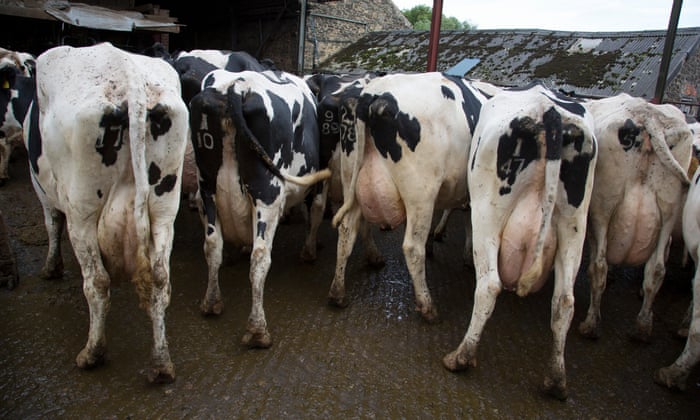Surcharges of 40% on beef and 20% on milk would compensate for climate damage and deter people from consuming as much unhealthy food

Food production causes a quarter of greenhouse gas emissions, largely from the raising of cattle and other livestock. Photograph: Mike Kemp/Getty Images
Climate taxes on meat and milk would lead to huge and vital cuts in carbon emissions as well as saving half a million lives a year via healthier diets, according to the first global analysis of the issue.
Surcharges of 40% on beef and 20% on milk would account for the damage their production causes people via climate change, an Oxford University team has calculated. These taxes would then deter people from consuming as much of these foods, reducing both emissions and illness, the team said.
Food production causes a quarter of all the greenhouse gas emissions that are driving global warming, largely from the raising of cattle and other livestock. These emissions are increasing as people around the world become richer and eat more meat.
Marco Springmann, from the Oxford Martin Programme on the Future of Food, who led the study, said: “It is clear that if we don’t do something about the emissions from our food system, we have no chance of limiting climate change below 2C.
“But if you’d have to pay 40% more for your steak, you might choose to have it once a week instead of twice.”
The research, published in the journal Nature Climate Change, evaluated the tax required for each food type to compensate for the climate damage its production causes. Beef has a heavy footprint, due to the deforestation and methane emissions associated with cattle and the grains they are fed, and needed a 40% tax on average across the world.
The scientists then assessed how much less of each food type would be eaten as a result of the taxes. They examined different tax regimes and found the optimum arrangement in terms of both emissions and health was to combine the taxes with subsidies for healthy foods, such as fruit and vegetables, and payments to people to compensate for price increases. This ensured poorer people did not end up with worse diets as the result of taxation.
This optimum tax plan would reduce climate emissions by 1 billion tonnes a year – the same as the entire global aviation industry. This huge potential cut in emissions surprised Springmann, as did the heavy impact of dairy products.
Changes to how food is produced and consumed have largely been ignored in the battle against climate change, due to public sensitivity about their food choices, fears about increasing hunger in poorer parts of the world and the lack of straightforward measures to tackle the problem.
“If people see any food price rise, they get angry, so you have to explain why you are doing it,” said Springmann, adding that a successful food tax policy could spend all the money it raised on ensuring people could afford healthier diets. He said a tax in Denmark on unhealthy saturated fats, where the government simply kept all the revenue, was aborted after a year. But in Mexico, a sugar tax on soft drinks has been successful after the funds were spent on free drinking water in schools.
Most of the foods with big climate impacts also happen to be unhealthy when eaten in large quantities, such as beef and dairy. Therefore, if climate taxes cut consumption, fewer people would die from related diseases such as heart disease, strokes and cancers. In the US, for example, people eat three times the recommended level of meat. The researchers found climate taxes would save more than half a million early deaths every year, largely in Europe, the US, Australia and China.
However, cutting the demand for meat and dairy would not be easy, said Rob Bailey, research director at UK thinktank Chatham House: “The challenge is political. As the new research demonstrates, in many countries there is a very strong public health and climate case for dietary change, but it isn’t happening. Governments are reluctant to ‘interfere’ in people’s lifestyle choices for fear of a public backlash and criticism for ‘nanny statism’, as well as the reaction from powerful interests in the food industry and agricultural lobby.”
Bailey said there was currently little pressure on governments to act, partly because the public understanding of the link between diet and climate change is low. But, when people are informed, they find meat taxes far less unpalatablethan is supposed, he said.
Calls to cut meat-eating, by the UN and high-profile figures including climate change experts and the economist Lord Stern, have so far been both rare and controversial.
The new research found the taxes needed to compensate for climate damage were 15% on lamb, 8.5% on chicken, 7% on pork and 5% on eggs. Vegetable oil required a large tax of 25%, but this was due to the low initial price of the product, making a relatively modest surcharge look high.
These tax levels were global averages but there was significant variation with, for example, the beef tax being higher in Latin America, where cattle-raising produces more emissions than in other regions. The optimum tax plan also had regional variations, including limiting climate taxes to beef in the lowest income countries, to ensure people there were still able to afford decent diets.
Springmann said it was critical to find a way to cut the environmental impact of food production: “Either we have climate change and more heart disease, diabetes and obesity, or we do something about the food system.”
Comments